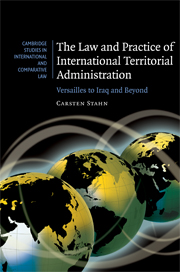Book contents
- Frontmatter
- Contents
- Foreword
- Preface
- Selected table of cases
- List of abbreviations
- Table of engagements
- Introduction
- Part I The historical and social context of international territorial administration
- Part II The practice of international territorial administration: a retrospective
- Part III The foundations of international territorial administration
- Part IV A typology of legal problems arising within the context of international territorial administration
- Introduction
- 13 The legal status of the administered territory
- 14 The status of international administering authorities
- 15 The exercise of regulatory authority within the framework of international administrations
- 16 The relationship with domestic actors
- Part V International territorial administration at the verge of the twenty-first century: achievements, challenges and lessons learned
- Bibliography
- Index
- CAMBRIDGE STUDIES IN INTERNATIONAL AND COMPARATIVE LAW
Introduction
Published online by Cambridge University Press: 19 January 2010
- Frontmatter
- Contents
- Foreword
- Preface
- Selected table of cases
- List of abbreviations
- Table of engagements
- Introduction
- Part I The historical and social context of international territorial administration
- Part II The practice of international territorial administration: a retrospective
- Part III The foundations of international territorial administration
- Part IV A typology of legal problems arising within the context of international territorial administration
- Introduction
- 13 The legal status of the administered territory
- 14 The status of international administering authorities
- 15 The exercise of regulatory authority within the framework of international administrations
- 16 The relationship with domestic actors
- Part V International territorial administration at the verge of the twenty-first century: achievements, challenges and lessons learned
- Bibliography
- Index
- CAMBRIDGE STUDIES IN INTERNATIONAL AND COMPARATIVE LAW
Summary
Under classical international law, the domestic and the international legal orders are portrayed as separate legal orders. International law is conceived as a body of law applicable to various subjects of international law, while municipal law is regarded as the law which applies within a state and between the citizens and institutions of that entity. This strict separation is blurred in the context of international territorial administration. Transitional administrations operate at the edge of the traditional law of international organisations and domestic law. They may be subject to two legal orders when administering territories: the internal legal order of the international legal person or entity which created them and the domestic legal order of the administered territory.
This particularity poses a number of conceptual challenges for international law. Four issues merit special attention in this regard: the legal status of the administered territory, the status of international entities as administering powers, the nature and scope of international lawmaking and the obligations of the administering powers vis-à-vis the people of the territory.
- Type
- Chapter
- Information
- The Law and Practice of International Territorial AdministrationVersailles to Iraq and Beyond, pp. 533 - 534Publisher: Cambridge University PressPrint publication year: 2008

